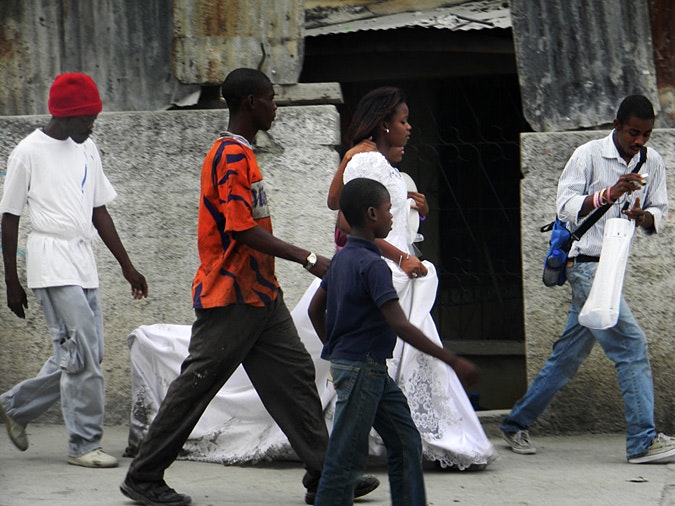Haiti: Among the Real-Life Tragedies, Theater
By Michele Lemoine

The earthquake cracked and razed the theaters of Port-au-Prince. Falling rubble and clouds of dust consumed stages where actors had entertained, questioned, and provoked. For almost a decade, FOKAL (Fondation Connaissance et Liberté, the Open Society Foundation in Haiti) had organized a theater festival, the Festival de Théâtre Quatre Chemins, to stimulate the development of young Haitian actors, writers, directors, and technicians and to give them opportunities to instill in their audiences a sense of citizenship, a sense of belonging to Haiti, with artistic presentations of its daily dilemmas, cruel choices, comic relief, and imaginings of alternative lives.
The destruction and ensuing chaos made it impossible to hold the Festival Quatre Chemins in 2010. So FOKAL devised three workshops that would fling young Haitian actors onto an unconventional (and only available) stage: the open-air stage of the Haitian every day, the streets of Port-au-Prince. FOKAL arranged for two leading French producers of street theater, Hervée de Lafond and Jacques Livchine and collaborators from the Théâtre de l'Unité, to travel to Port-au-Prince in December 2010 and present a workshop.
Real life brought fire and smoke. In the wake of the cholera epidemic and a rigged national election, rioters took to the capital’s streets. Tires burned. Looters ransacked stores. Vehicle traffic was curtailed. People cowered in their homes. The actors who managed to wend their way through a maze of roadblocks had to work in the instructors’ hotel, which, like all public buildings in the capital, is protected by armed guards.
In the rooms and on the chairs and sofas of the hotel lobby, the participants wrote scripts and rehearsed. After the riots subsided, one group of actors used the hotel’s front yard, its terrace facing the Caribbean, and its front-facing rooms as a stage to perform a play. Another group took to the streets dressed in red blazers and marching to the sound of a whistle.
They sang lullabies to young children, directed traffic at a crossroads, and whispered love poems to the sidewalk crowd. This group had found trouble a few days earlier because their costumes, the yellow t-shirts of Théâtre de l'Unité, seemed to publicize the party of the incumbent president. People jeered and shouted insults until someone explained the misunderstanding.
Then Betty Laurent, a 24-year-old actress more at home with the absurdities of Beckett and Ionescu, emerged from FOKAL wearing a magnificent wedding gown. She entered the street alone, as if she had been left standing at the altar by her groom. Up one street and down the next, she wandered in a trance: inconsolable, oblivious to the traffic, at one point lying down on a sidewalk.
Passersby sensed a tragedy in progress. Men and women came to her aid. “Where is your family?” “Where is the groom’s family?” Several men offered to marry the frustrated bride right then and there. Others shooed away a photographer who seemed to be butting in like a paparazzi. (FOKAL had hired him to document the performance.) Such is life in Haiti: a jilted bride stumbling through streets, encountering the caring, the impulsive, the apathetic, and all the rest of it…surrounded by misery and a million people living in tents.
Theater is important everywhere. But it can be crucial to Haiti, where for so many people watching a play is a luxury and there are few funds for producing plays, educating actors, and developing theaters. Haitians have an oral culture, a culture of telling stories, a culture of the spoken word. Theater uses words and stories and enables us to examine and reflect upon how we live our daily lives. It is about feelings, about loss, about struggle, about politics, about triumph and frustration, a lot of frustration, and everything else that makes the world here.
Michele Lemoine is art and culture coordinator at the Fondation Connaissance et Liberté (FOKAL).